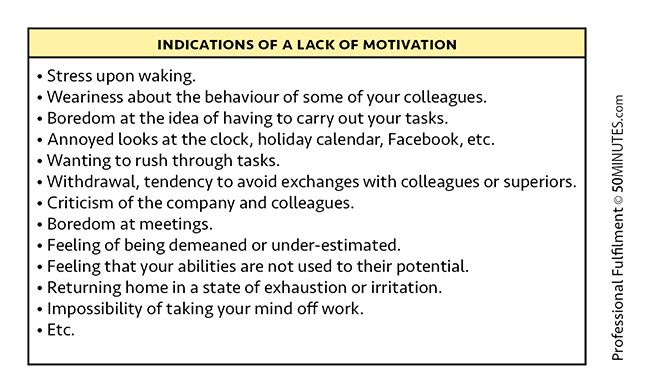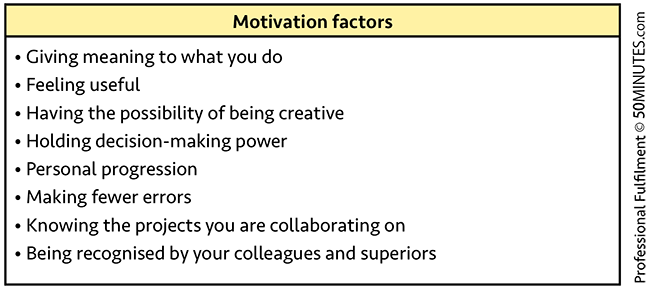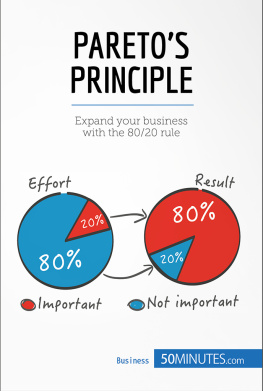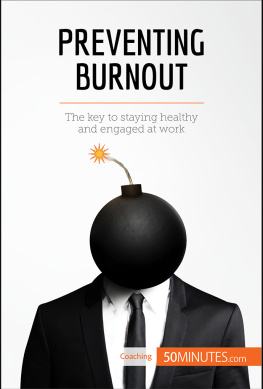While the unemployed continue to be demoralised, those who have jobs are told they should consider themselves very lucky. However, that statement appears quite relative if the job in question is not a source of fulfilment. Although work guides our lives and provides financial stability, it does not provide for all of our personal needs. It could even cause unhappiness that is difficult to put into perspective or eradicate.
Nonetheless, we live in a society where it is assumed that leisure time is a right. Some employers even use the harmony between private and professional life as an argument, offering the possibility of working from home or providing flexible working hours to suit their employees.
All that remains is to ensure the notion of professional fulfilment. What is this delicate balance that makes us look forward to the idea of going to work in the morning? How can we implement new habits based on one person, without negatively affecting an entire team? Is the value of one happy employee more than that of an unmotivated employee? How can we feel that we are in the right place and give meaning to our work? How can we make sure that we head home feeling accomplished, rather than crestfallen? In this guide we will look at how to do each of these things according to ten essential points, placing the key to professional fulfilment in your hands.
What makes a fulfilled employee?
In an ideal world, you would work on projects that are close to your heart, in a dynamic and friendly team. You would come home feeling relaxed, allowing you to enjoy your private life once you leave the office. Doesnt that thought paint a pretty picture? Unfortunately, this ideal world does not yet correspond with the one that we experience every day.
Stress related to job instability, lack of questioning or even a lack of imagination makes us forget that all that time spent at work is actually a time to which every human being must be able to give meaning. Of course, some claim to be satisfied with a big paycheque at the end of each month. Yet, it is clear that even the high earners are seeking mainly to achieve greater professional fulfilment that goes beyond their salaries. At the end of the day, money isnt everything.
Determining what makes us happy at work is a mission that can seem difficult when you have to juggle multiple parameters. You might feel uncomfortable, without knowing exactly what the problem is. This is likely to come down to a set of objectives that contradict and fight one another, and which are sometimes difficult to distinguish.
Yes, but The game that slows everything down
If I asked you Do you like your job?, you might answer with Yes, but. The psychological game of Yes, but was popularised by Yves Lavandier in a feature film. It is actually a concept created by Eric Berne, the founder of transactional analysis. This game, played by two people, allows the person who begins his sentence in this manner to hide his emotions, drowning them in a cacophonous set of contradictory ideas. The Yes, but answer keeps you in a victim-like state, refusing solutions and stopping you in your quest for fulfilment.
Indications of a lack of motivation
Are you lucky enough to have a job? Are you happy to collaborate on a project that you find worthwhile or relevant? This is already a good start. However, you experience some of the following symptoms:

The list of indications of a lack of motivation goes on and on. Being surrounded by colleagues who are at the same stage as you is terrible for morale. Therefore, beware, because the risk in this situation is that your condition will deteriorate further and put you in an awful state. Successfully identifying the origin of your discomfort is the first step towards change.
Note for employers
There are some behaviours that make it possible to notice a lack of motivation in an employee: higher expenses, taking office equipment home (lack of respect for business assets), arriving later or leaving earlier. These indicators may reveal the need to return meaning to their work. The ability to listen then becomes the greatest tool for re-creating a nurturing environment with this employee.
Factors of professional fulfilment
Several factors of fulfilment are observed in happy employees. Among these are:

Using this list or a list of your own, determine what objectives would motivate you in your workplace. Then you can easily decide where to focus your efforts.
Set your goals
To be able to feel fulfilled in the workplace, many employees are willing to accept lower wages. The key here is to determine whether money is an objective in itself, i.e. if the main focus of your working life is not to contribute to your life, but to maintain a healthy bank balance.
Other objectives are indeed possible. Perhaps you are the kind of person who is fascinated by analysis? Does your taste for discovery and ingenuity prompt you to challenge yourself? You are likely to need a job that puts you in contact with new topics that require deep thought. In this case, repetitive work is not for you. Choose a career that matches your aspirations. If you find that your schedule is a problem, your goal may be to find a job with flexible hours, which respect and value your family life. It is important to list the things that are problematic now so that you can turn your attention to the conditions necessary for the fulfilment of your goals.
Psychologists view
An article in the Journal des psychologues explores the results of a study on French teachers. The author, Pascale Desrumaux, discusses the concept of welfare at work and writes: In the workplace, employers have a duty to ensure the welfare of their employees.
Business is all about profitability. To achieve this, it relies on the quality of productivity. This is only possible if the employees work in a state of wellbeing, so it is logical for employers to make this one of their primary concerns. Wellbeing and discontent are essential components to the success or failure of a business. Finally, companies are responsible for their employees, and therefore their physical and psychological states.
























